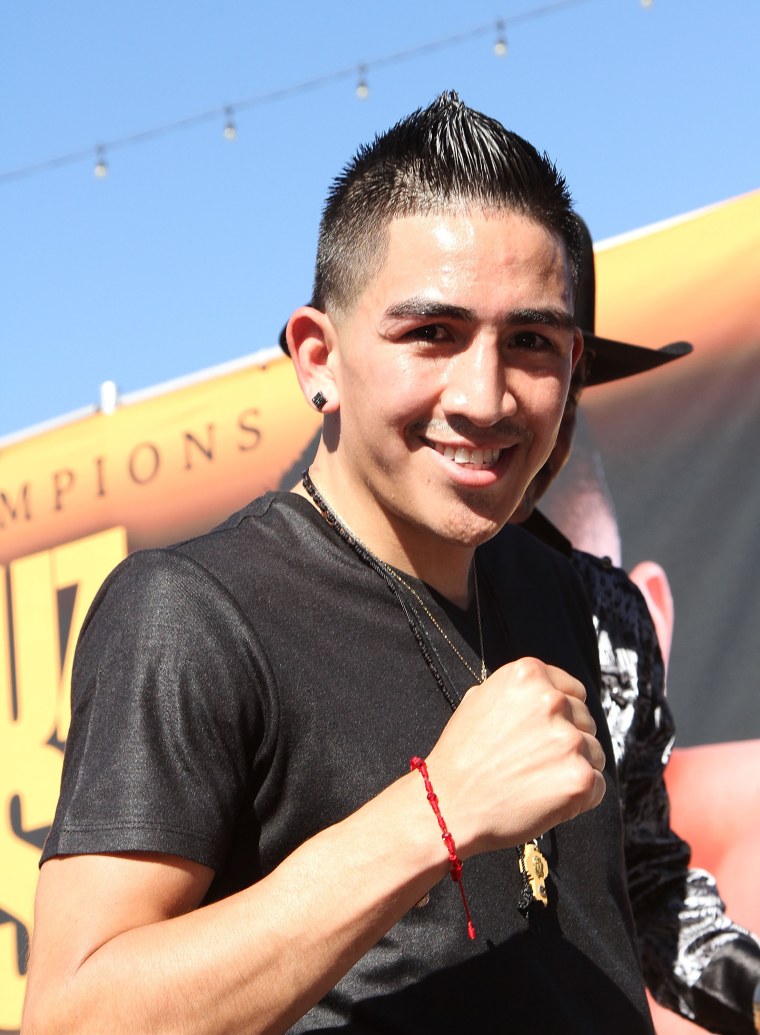NAME: Leo “El Terremoto” Santa Cruz
AGE: 27
HERITAGE: Mexican-American via East Los Angeles
HOMETOWN: La Habra, California
OCCUPATION: Professional Boxer
Leo is a first-generation Mexican-American, representing a millennial multicultural generation that is shaping culture, politics, economies and sports. He’s a World Champion boxer in three divisions and is very connected with his family – together they train, mentor and bring up fighters within their family-owned gym. Notably, Leo fought as part of the Mayweather-Manny Pacquiao pay-per-view fight in May 2015 and won his 126-pound debut with a 10-round unanimous decision over Jose Cayetano. At press time, Leo’s record was 31 wins, Zero losses, 1 Draw and 17 Knockouts.
When you were a little kid did you dream about stepping into the ring?
No, I wanted to be a policeman; I wanted to serve out justice and get the bad guys.
But then, when I was 8 years old, I was at the gym one day with my dad and my brother and I had never been in the ring. They told me to get in and I did – and I did really good.
When did it become obvious that your skills went beyond just being an afterschool hobby?
I think when I was 12 years old I started fighting tournaments – and winning. Then I knew I wanted to become a professional boxer and make that my career. My role models were Oscar de la Hoya, Julio Cesar Chavez Sr. and Floyd Mayweather.
Did being a young boxer really boost your popularity at school?
I was always a quiet guy, so no one bothered me and I didn’t bother anyone, either. In the beginning no one really knew I was into boxing and I didn’t really tell anybody. It wasn’t until 10th, 11th, 12th grade when I was winning local tournaments and having to go away for a week traveling and had to get permission to be out of school that word started getting around. People thought it was cool.
It must have been hard to compete at such a high level and still maintain good grades at school with all the training and travel.
It was. And I got, like, A’s and B’s because I would go to school, study there, and from there I would go straight to the gym to train. I never played with my friends from school.
It must have made all the difference in the world to have your family be so supportive of your training and your career dreams.
My dad was the one who fell in love with boxing when he was young but couldn’t pursue it as a career – he had come to the U.S. and had to work to make a living so he always said that if his sons were into it he’d support them.
My family keeps me going, they make me think about everything I suffered – the sacrifices, all the exercise. I have three brothers and all of them box. The oldest one retired after just six professional fights – we were struggling, so he started working to put food on the table.
The next oldest brother was a WBC interim world champion 7 seven years ago but he had to retire because of swelling in the head. My younger brother fought, too, but got lupus so he had to retire.
With all the new science and technology pointing to the risks of such a demanding sport, do you fear traumatic brain injury?
I have two kids and I thank God that I have a good career, that I am able to support my family and have a safe place to live. So, that’s always a fear – but the biggest fear is of losing. You just have to go out there and you do what you’ve trained for.
I’ve seen fighters get hurt and go into comas after a fight and I wonder, “What would happen to me, what would happen to my kids if that happened?” But I’m trying to give my family a great life and that keeps me going out there and not caring about what could happen.
I believe in God, 100 percent, every time. When I go to fight, I pray that everything goes good, that no one gets hurt with brain injuries and that he protects both fighters. I tell Him to protect me and give me the strength to go out there and give great fights.
You have a son and a daughter, do you want them to go into boxing?
The truth is that I wouldn’t really want my kids to become boxers. I know all the suffering you go through. But if my son really wants to learn to fight, I’d help him learn to protect himself, defend himself. My daughter, too – women, if they want to become boxers I say “Do it.” I wish there were more people to train the girls, they could become big! Girls should totally learn to fight and it would also help them protect themselves from other things.
Boxing is physical, but also mental and spiritual – what makes for a winner?
I believe 100 percent that my dreams will come true, that’s what you have to believe. Then, of course, you have to be dedicated – you have to put effort into it and don’t go messing around. When I speak with kids at schools I tell them that whatever it is – it doesn’t have to be boxing, it could be any sport or any discipline – you have to train hard, never never ever give up and give it 100 percent and at the end, their dreams will come true. I wanted to be a boxer, I’m now a world champion – I’m living my dream and I’m getting more than I ever expected.
Esther J. Cepeda is a Chicago-based journalist and a nationally syndicated columnist for The Washington Post Writers Group. Follow her on Twitter, @estherjcepeda
